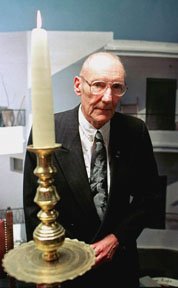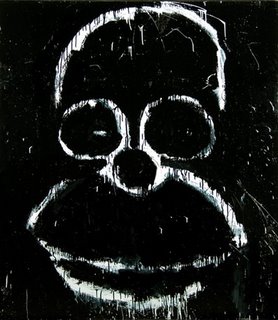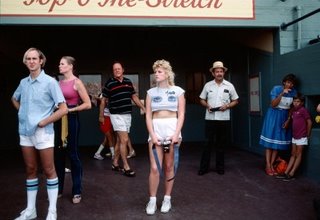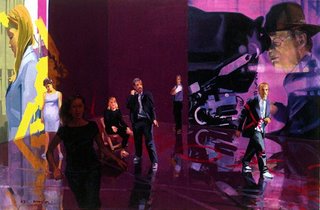
Albert Renger-Patzsch, Cows at the Mouth of the Ruhr River, 1934
* A Crack In the Stone Wall. excerpt:
"It was one of the more outrageous moments in the story of the Bush administration’s illegal domestic wiretapping. Almost a year ago, Congressional Democrats called for a review of the Justice Department’s role in the program. But the department investigators assigned to do the job were unable to proceed because the White House, at President Bush’s personal direction, refused to give them the necessary security clearance.
"Now the president, for reasons we can’t help thinking might have something to do with this month’s elections, has changed his mind. The White House will give Justice Department inspectors the required clearance, and a review will go forward.
"That’s all to the good, as long as the investigation is not intended to pre-empt any efforts by the new Democratic majority to conduct its own Congressional review of the wiretap program. The Justice Department inquiry will hardly do the full job."
...
"The Justice Department inquiry also will do nothing to fix the biggest problem with Mr. Bush’s eavesdropping program, which is that — once again — he ignored existing law and instead tried to create a system outside the law, resting on his dangerously expansive claims of executive power.
"If Mr. Bush had wanted to conduct the wiretapping within the law, he could have quite easily done so, using the Foreign Intelligence Surveillance Act. That law, written after the Watergate scandal and the eavesdropping abuses of the Vietnam era, created a special court to approve applications for domestic surveillance. The court operates in secret, and has rarely denied the authorities’ requests. Even in the post-9/11 era, it should have met the administration’s needs. And if there was a problem, Congress had shown itself ready and willing to amend the law."
...
"The question of the wiretap program’s constitutionality is now making its way through the courts and should ultimately be decided by the Supreme Court. Congress should not be satisfied with Mr. Fine’s very limited investigation. It should mount its own independent inquiry into how the war on terror, and American civil liberties, are being affected by an eavesdropping program about which we have been told so little."
* Drug prohibition not working in England either. excerpt:
The war on drugs "makes the war on terror look like a pushover. The latest figures from the European drug monitoring agency indicate that Britain leads the continent in cocaine and heroin use and is equalled only by Denmark for cannabis. Given how often prohibitionists abuse Holland’s proactive drugs policy, it is worth noting that twice as many Britons as Dutch use cocaine and a third more use cannabis. With 327,000 so-called 'problem users' (up a quarter on the last estimate), Britain is far worse than France, Germany and Italy."
...
"British drugs policy is a disaster. Parliament’s refusal for more than a third of a century even to amend the prohibitionist 1971 Misuse of Drugs Act is the most damning comment on the state of politics today, in thrall to the tabloid mob. The 1971 act must be the only criminal justice statute not to have been rewritten a dozen times by Tory and Labour governments. Charles Clarke and John Reid pass four terrorism acts a year, yet not one to tackle the drug market. The act contributes to the deaths of hundreds of young people each year. It stokes violent crime and impoverishes families and communities, while giving Britain the biggest prison population in Europe. Yet nobody in politics has the guts to touch it."
...
"The prohibitionists think that by passing laws they are curing a problem. In reality universal drug availability ensures just two things. An industry catering to almost a third of Britons (reputedly with a turnover similar to that of the petrol or drinks industries) prospers uncontrolled and untaxed. At the same time the quality of its product is unregulated and therefore at risk of adulteration. The dilution of cocaine has recently been shown to be highly carcinogenic. Crooks are making millions out of killing people.
"Most drug users can handle the harm it undoubtedly does them personally. To this extent there is no justification for the state interfering in a private activity. As with the control of alcohol, the regulation of outlets should be required only to protect minors, prevent adulteration and collect taxes. Other European countries are moving in this direction, at least with ecstasy, cannabis and heroin.
"Britain must find a way of legalising supplies. Only then can smuggling and racketeering be suppressed. How this is achieved is a subsidiary matter and a good subject for a committee. But the prohibitionist softies must first be outgunned. They are the true enemies of drug control. This market will never go away. The only tough policy is to regulate it.
"More people die each year from adulterated drugs than from terrorism. The cost of prohibition both to the state and to the community is colossal. The illicit market in drugs undermines Britain’s communities and subverts British values far more than any Muslim cleric or rucksack bomber.
"It will never be confronted until the counterproductive prohibitionist 1971 act is repealed."
* "Experience is never limited, and it is never complete; it is an immense sensibility, a kind of huge spider-web of the finest silken threads suspended in the chamber of consciousness, and catching every air-borne particle in its tissue." -- Henry James



















